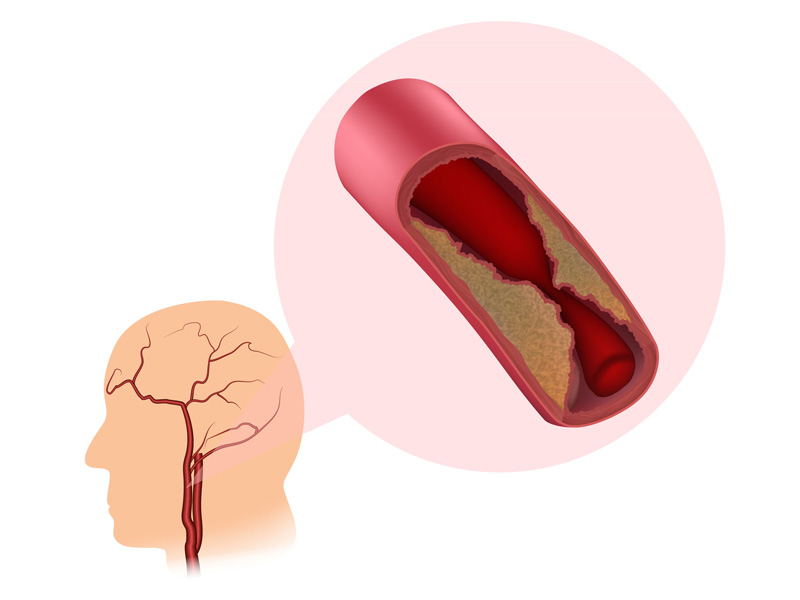Final Recommendation Statement
USPSTF: Do Not Screen for Carotid Artery Stenosis
February 12, 2021, 2:30 pm News Staff — On Feb. 2, the U.S. Preventive Services Task Force posted a final recommendation statement, final evidence review and evidence summary on screening for asymptomatic carotid artery stenosis in the general adult population.

Based on its review of the evidence, the task force recommended against screening for asymptomatic CAS in the general adult population. This is a “D” recommendation, and applies to adults without a history of stroke or neurologic signs or symptoms of a transient ischemic attack.
“The Task Force wants to help prevent people from having a stroke, but screening for CAS is not an effective way to do so,” said Michael Barry, M.D., a member of the task force, in a news release. “Unfortunately, screening for CAS in adults without symptoms does more harm than good, and we continue to recommend against it.”
Although the prevalence of asymptomatic CAS is rare, it is one of several factors for increased stroke risk, particularly ischemic stroke, which affects more than 690,000 Americans each year. Additional research has suggested that for patients with severe CAS who don’t receive optimal cardiovascular preventive care, the annual risk of stroke is between 2% and 4%.
Update of Previous Recommendation
The final recommendation mirrors a draft recommendation posted by the USPSTF in August 2020, and is consistent with the task force’s July 2014 recommendation on the topic. The AAFP supported the 2014 recommendation.
Story Highlights
In its evidence review, the task force conducted a literature search of trials published between Jan. 1, 2014, and Feb. 14, 2020, with ongoing surveillance of relevant literature through Nov. 20, 2020. The review included two small trials and seven studies, the results of which were analyzed in 23 articles.
The task force stated that the overall conclusions from the current literature review were consistent with those of the previous literature review. Among the findings, the USPSTF found no externally validated risk stratification tools that could reliably distinguish between asymptomatic persons who have clinically important CAS and persons who do not, or the risk of stroke related to CAS.
The task force also stated that population-based screening trials to examine the benefits and harms of screening for CAS have never been conducted; as such, they were unable to identify any trials that directly examined the benefits or harms of screening for asymptomatic CAS. However, two ongoing trials — the 2nd European Carotid Surgery Trial and the Carotid Revascularization and Medical Management for Asymptomatic Carotid Stenosis Trial — are comparing best medical treatment alone to carotid endarterectomy or CAS plus best medical treatment and may provide some indirect evidence as to whether carotid vascularization is superior to best medical management. The estimated primary completion dates for these trials are March 2022 and December 2022, respectively.
In addition, a review of large national administrative databases and vascular surgery rates found wide variances in postoperative 30-day stroke/death complication rates for CEA and CAS. According to the task force, these findings suggest that careful surgeon/operator and patient selection is critical to realizing benefits from screening and revascularization.
Related Recommendations
While the USPSTF recommends against screening for asymptomatic CAS, it has issued several recommendation statements to help clinicians and patients reduce stroke risk through other methods, including:
- aspirin use to prevent cardiovascular disease and colorectal cancer;
- interventions for tobacco smoking cessation in adults, including pregnant patients;
- interventions to promote a healthy diet and physical activity for the prevention of cardiovascular disease in adults with and without known cardiovascular risk factors;
- screening for abdominal aortic aneurysm; and
- screening for high blood pressure in adults.
It should also be noted that the recommendation against screening for CAS in asymptomatic adult patients is one of several recommendations included in the Academy’s Choosing Wisely campaign.
Response to Public Comments
A draft recommendation statement was posted for public comment on the USPSTF website from Aug. 4, 2020, to Aug. 31, 2020.
In response to several commenters who noted that the term “general adult population” includes patients who may be at increased risk for CAS or stroke, and that other organizations recommend screening in those at increased risk, the task force added language to note several risk factors for developing CAS. It also clarified that the studies in the evidence review included participants with these risk factors, and that the USPSTF found no benefit in screening asymptomatic populations.
Several respondents questioned the USPSTF’s conclusions regarding the harms associated with surgical interventions and the comparative benefit of best medical therapy versus CEA. They pointed to several studies that have demonstrated the benefits of CEA over best medical therapy to reduce stroke risk in asymptomatic persons, and noted that newer and safer procedures such as transcarotid artery revascularization may shift the balance of net benefit, but were not reviewed. In response, the USPSTF stated that it reviewed all available evidence and concluded that the magnitude of benefit would be smaller in truly asymptomatic persons in the general population than among selected persons in trials. The task force also added language about the new studies it considered, and stated that the review found no studies that examined the benefits and harms of transcarotid artery revascularization.
Next Steps
The AAFP's Commission on Health of the Public and Science plans to review the USPSTF's final recommendation statement, final evidence summary and evidence review, and will then determine the Academy's stance on the recommendation.